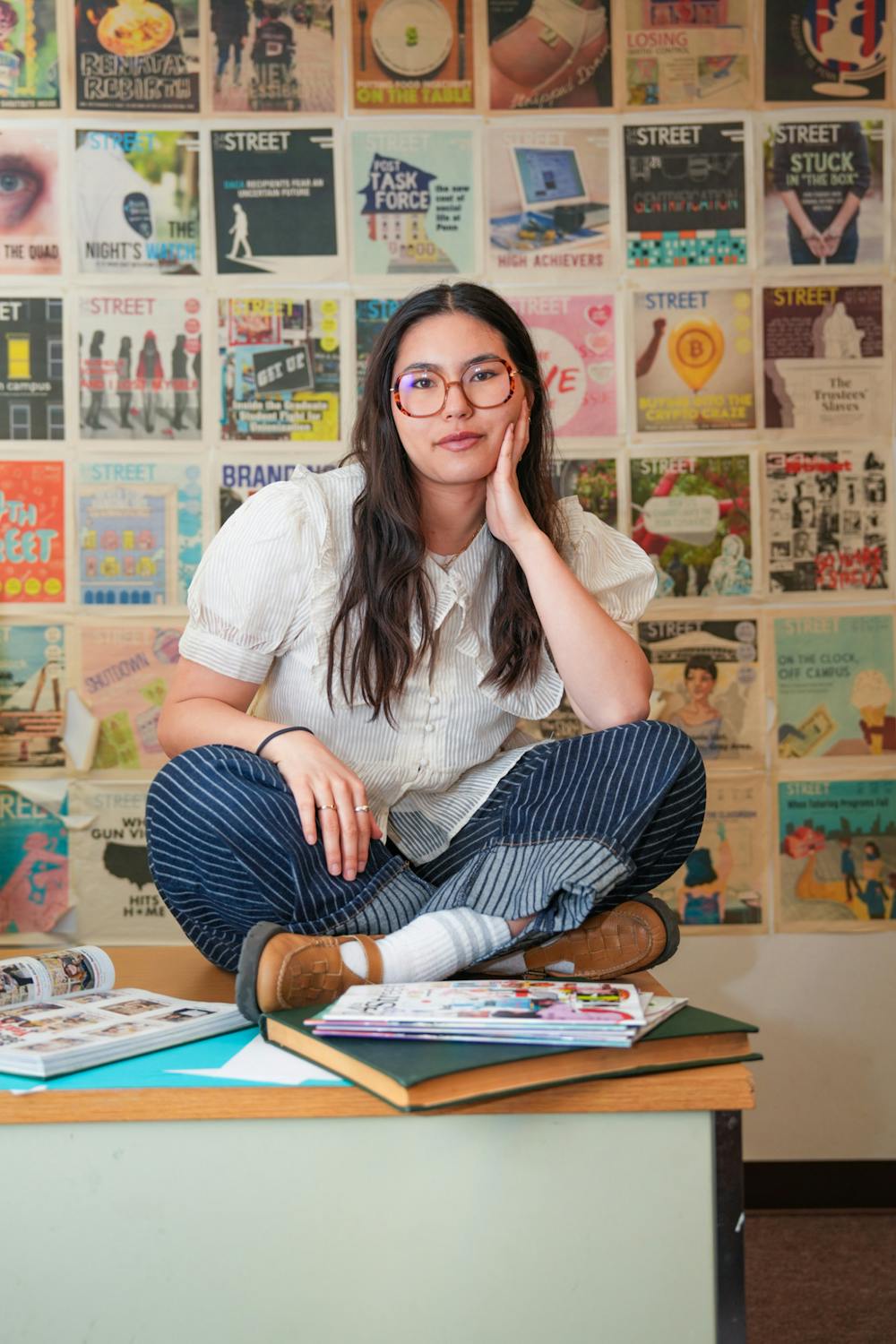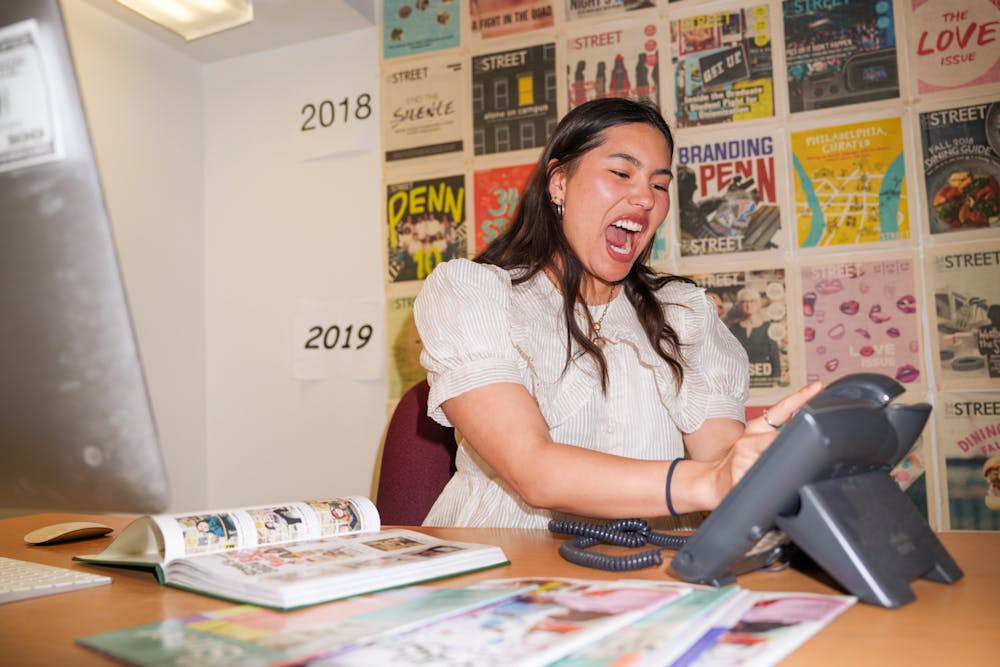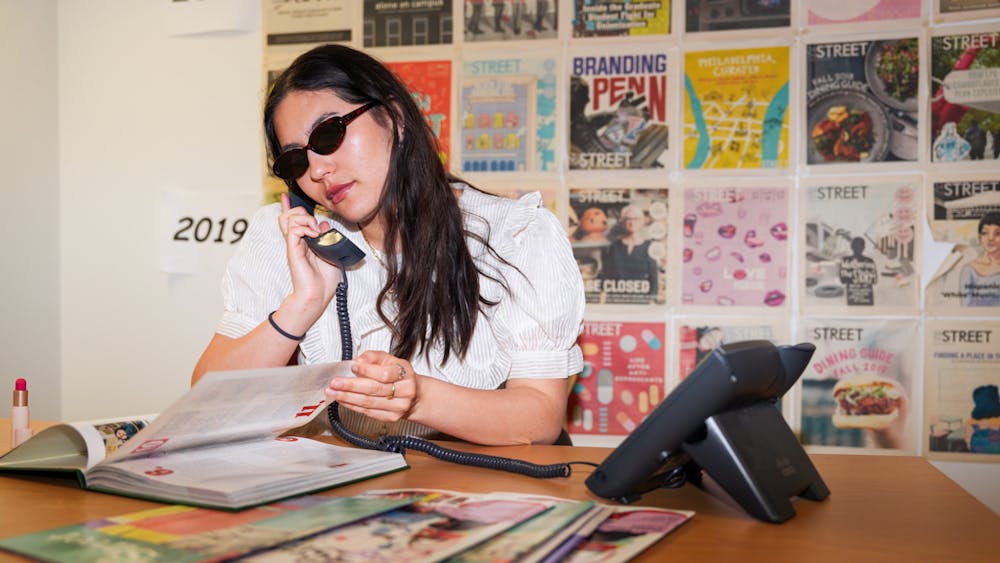“Mommy pays,” insists Natalia Castillo (C '25), picking up the bill for the two of us at Abyssinia—before sheepishly asking me to calculate the tip. For the past year, Natalia has dutifully played the role of Street’s mother. She has stayed up till 4 a.m. to finalize the Dining Guide, stood out in the cold forcing issues of Street into the hands of reluctant readers, and even faced off against a booing crowd at Smokes for a Street launch event. But, more than anything, Natalia has been a mother in the way that she has turned Street into a home for so many.
The first time I met Natalia was during my freshman fall when I came into the Marks Family Writing Center with my very first college paper—it had something to do with Berlin. At that moment, I got my first glimpse of Natalia’s acute ability to bring out the best in any writing placed before her. I had no clue that within a few years, this intimidating and clearly quite talented tutor would become my colleague, partner in crime, and one of my best friends—who would also bring out the best in me.
Set upon the background noise of a couple on an excruciatingly painful first date, Natalia and I dug into a shared plate of Ethiopian food and an even more filling conversation about friendship, writing, and all the other cliches that make Street the home that it has become over this past year. When we finished, I walked Natalia back to her house just to keep the conversation going for a few more minutes before she headed off to water polo practice, and I walked back to the Street office.

Hometown: Marin County, California
Major: PPE with a concentration in Globalization, minor in English
Activities: 34th Street Magazine, Penn Club Women’s Water Polo, Marks Family Writing Center Fellow, Climate Research, Civic Scholars, Penn Journal of Philosophy, Politics & Economics, Penn Club Swim
Your letters from the editor were all about philosophizing in Philly. What have you been philosophizing about recently?
I've been philosophizing a lot about what comes next. This is going very serious, very quickly. With everything that's been happening under the Trump administration, I’ve been talking about what environmentalism means. How do you embed yourself in your communities? I was talking with my friends a lot over break during our Global Seminar class (Comparative Cultures of Resilience and Sustainability in the Netherlands and the United States taught by Simon Richter PhD.) about how important it is to do work within your community, focus on grassroots efforts, and make change in small ways. If everyone does that, then you actually have change on a mass scale. So many people have been saying lately that culture is upstream from politics, so how do we make a positive difference in our culture?
On a lighter note, I’ve been philosophizing about how important hobbies are. When you stop something like Street, you return to the things that used to fill your free time. I used to be very good about having things like crocheting, crafting, drawing, journaling, and reading, so I've been enjoying getting back into those things and reading a lot more.
What are you reading right now?
I’m reading Han Kang's book, Human Acts. I just bought it when I was in the Netherlands because I love to buy a book in every city or country that I visit. It's about the 1980s uprisings in Gwangju. It's been really interesting to read about that history.
In your letter of extent, you wrote to me, you told me to “give them a place to call home," and I was wondering was your journey like at Penn for finding your own home?
I was very lucky to find a community my first semester freshman year. I saw a lot of people finding that group that they would do everything with. I didn't feel like I had that quite yet, but club sports was that first “thing” for me, and it’s where I met my best friend and roommate, Allison Jiang.
It was so beautiful to find that community early on in sports, especially because so many people at Penn get the advice to do extracurriculars, but they don't get the advice to do things that are non–academic or non–professional. With club sports, there are no stakes. You're not making it your profession. It's such a great place to find people and also escape the bubble.
Then I watched Kate Ratner write for Street, and I thought she was the coolest person ever. I really, really wanted to do editing. I didn't even want to do writing at first because I liked helping people write. I learned very quickly, that's not how Street works. I started as a staff writer, and because the people that I met were so encouraging—like Arielle (Print Managing Editor ‘23) and Walden (Editor in Chief ‘23)—I felt like there was a place for me to grow there.
I owe so much of who I am now to upperclassmen who showed me a way to be part of the Penn community. One of my friends that I met through water polo was the reason that I became a writing tutor, and then the people that I met in Street were the reason that I stayed at Street.
What does editing mean to you?
I always just loved helping friends and my brother edit their papers. Eventually, it became a way to connect with other people and make writing an accessible tool where people can find their voice. So many people grow up thinking that writing is a skill that you're born with and that some people are just good writers and some people are bad writers. That's so far from the truth. I have found that editing is a way to help people find their voice and find their confidence. I also just love being able to look at a piece from a bird's eye view and puzzle things together.
Another thing that shaped the way I view writing was talking to Walden about the Writing Center. He told me about how he views writing as this act of communion between reader and writer. You know what you want to say in your head, and you have your perspective, but your reader is probably not in the same place. So the act of writing is moving closer together to reach that reader in the middle.
You ran for Street EIC on Zoom since you were abroad that semester. How did your experience abroad change your perspective of Penn and impact your decision to run for EIC?
Fun fact: I was planning to run for Digital Managing Editor because I thought Norah Rami was my age and was going to be the perfect EIC. But, Walden encouraged me to run for EIC, which had been a dream of mine that I put on the back burner when I did go abroad. It was helpful to have that space and distance to be able to come back in with a fresh pair of eyes.
In a place like the U.K., but also Cambridge in particular, people are very invested in their academics, but they also have very robust lives outside of school. I loved how casually intellectual people were, but they were also able to have conversations that didn't revolve around where they were going to work in the next two years or what assignments they had. When I was at Penn, I always longed for that community of people who didn't have to take themselves too seriously while also being invested in the things they love. It felt so serendipitous that when I came back, I was able to be enmeshed in a group of people that had that exact perspective through Street.
In terms of coming back to Street, it was funny because there were people who just didn't even know I existed, and they were like, “Who's this girl that's in charge now?” It was an important experience to come back into a place where I wasn't known by every single person that I was in charge of and having to earn that trust from people. Not only did I want to cultivate a community for other people, but I wanted to be able to create a community for myself too, because I was a newcomer in a way—even though I had been part of Street for a long time.
Emily White in their ego of the week, iconically said “journalistic objectivity is fucking bullshit.” What's the most journalistic, unobjective thing you’ve done?
That's what we talked about in journalism class today. I was saying that perfect objectivity is a fallacy. As an editor, there are times when a statement needs to be made, and to be “objective” is to be complicit in a narrative that doesn't need to continue. That's a decision we've made often at Street because we have always been that counterculture magazine. There comes a point where you have to make those decisions and think about the way you want to phrase things. As an editor, you have to know that objectivity is so false—every decision you make in journalism is a judgment–based choice. The way you choose to tell facts is a judgment in itself. Once you acknowledge that, you can get to a place where we are telling a fact–based narrative in a way that we believe is something we can stand by.

Last summer, you were reporting on climate disaster recovery in Puerto Rico as a fellow with the Pulitzer Center. I was wondering if you wanted to talk a little bit about that experience and how it is inspiring your future work.
I've been so lucky to do work over the summers that aligns with what I would like to do long–term. My family is Puerto Rican, and so I have had a close relationship with climate change. I also hadn't visited Puerto Rico in quite a few years, so going back this summer was really a homecoming. I felt like I could be reintegrated into a culture that I had experienced from childhood. Seeing my family and hearing their stories since Hurricane Maria was so moving. Plus, getting to speak Spanish was such an asset and such a special experience to be united with my family in that way.
Whenever we think about climate change in the classroom, it's very theoretical. I often shielded away from climate change research in high school because the only people around me doing it were people who didn't look like me and who were only worried about the environmental aspects—which is still really important. But, at the same time, my perspective on climate change is very much informed by distributive justice and the inequities of climate change’s impacts. Being on the ground in Puerto Rico and hearing from people about how they think disaster recovery and climate adaptation should be happening was so important for my understanding of how we should approach that change, especially from a grassroots level. I would like to continue with climate–based research, with a particular focus on communities in the Global South. I was so honored to be able to talk to people who were willing to share their experiences and were so energized to do something about climate change.
How do you feel like your experience as a student journalist is impacting that perspective that you have on research or policy or whatever it might be that you end up doing?
I've always felt very drawn to narratives. Freshman year, I remember procrastinating studying for my math quizzes because I was reading a profile about Jeremy Strong, the Succession actor. The way that journalists take what seems at face value like a singular fact or story and open up an entire world is so impactful. It teaches us not to just see things as a list of facts on paper but to see the people and the issues we're engaging with as an entire world housed within. A lot of the research that I’ve read when it comes to climate change can feel two–dimensional because it focuses on the science or theoretical questions, but it doesn't engage with the people that are already being impacted by these issues.
Climate change is not five, ten years off. It's already here, and it's been happening for many years already. Being able to integrate storytelling and interview–based research is so important, and I wouldn't be able to do that if I hadn't had a background in journalism.
We're at the final question, and I'm stealing this one from Walden verbatim: How has Street changed you?
For the better. Street has really been my family in the last couple of years. It has made Penn feel like a home. I was someone who came in freshman year not knowing what path I would follow. Street taught me how to care for a community—not only when it comes to journalism and thinking about how you engage with communities that aren't your own. But it also made me feel like a mother hen dealing with all of my writers and editors.
It taught me how to listen to people when they're talking about what they care about or what they're experiencing. It taught me how to cultivate a community, which is so “life–transferable.”
Street also taught me to be curious. When you're at a party and you don't know anyone, or you're in a space where you are an outsider—if you're just curious, you will always find your way. I think that people who are bad at making conversation are just not curious enough. Curiosity will get you anywhere.
I also think being part of Street allowed me to experience Philly in such a different way. I am coming away from these four years feeling like I did live here, and I did get to really learn about Philly. Not just Penn’s campus and Rittenhouse Square. I really got to experience so much more.
Lightning Round:
What's the soundtrack of your life right now? “California” by Joni Mitchell
Who would play you in a movie? Michelle Zauner in her acting debut
What mystical creature would you be? I think one of those frogs that has a mushroom hat.
What does PPE stand for? Wrong answers only. Picture–perfect and ethereal
There are two types of people at Penn… People who pick up Street on Locust and people who don't.
And you are? A secret third thing, the one who hands it out.
This interview has been edited and condensed for clarity.
Do you know that one senior who brings a smile to everyone’s face or always has the craaaziest stories? It’s time to give them the recognition they deserve. Ego of the Week seeks to showcase seniors not for their grades or any other academic construct, but for who they are as a person and the joy they bring to the people around them! Nominate your favorite Penn seniors for Ego of the Week!

